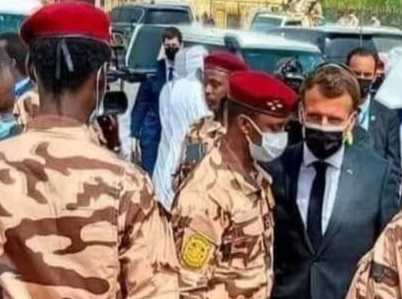France’s Imperial Dreams Turn Sour
When President Francois Mitterrand described France’s relationship with its former African colonies he said, “France is the big hen followed by the little black chicks.”
The late French leader was so determined to keep his imperial flock together that he approved Operation Turquoise, training and funding the Francophone Hutu insurgents responsible for the 1994 genocide in Rwanda. Local witnesses say that each day during the 100 days of the slaughter, a French plane brought more weapons with which the Interahamwe could murder the country’s one million Tutsis.
Mitterrand must be spinning in his grave. France’s sphere of influence has been undermined by a toxic mix of jihad insurgency, climate change, Russian disinformation, Chinese investment and demography. Mali, Central African Republic, and Burkina Faso – all former satrapies of France – have recently decoupled, and Niger may be next. France is reduced to scuttling around Africa, anointing kleptocratic and undemocratic family dynasties in Chad and Cameroon in order to cling to its flock.
A 3,000-strong outpost of the French Foreign Legion is headquartered in Chad. When President Idriss Déby was killed in 2021, President Emmanuel Macron rushed to N’Djamena and conferred his support for Déby’s son, Mahamat Deby. Unsurprisingly, in this unconstitutional environment, the threat of unrest persists, counter to France’s stated desire for stability.
In Cameroon, where the restive Anglophone minority has been marginalised and oppressed for decades, the Élysée Palace may be considering bestowing its blessing on the son of 90-year-old dictator President Paul Biya. This power transfer would be unconstitutional and reward Biya’s mishandling of the six-year Anglophone Crisis, a conflict that has wrecked one-fifth of the country. In neither Chad nor Cameroon do the French sufficiently remark on human rights abuses, the killing or imprisonment of peaceful opponents and journalists, the crushing of civil society, or the absence of democracy or free speech.
At the 1885 Berlin Conference, France took the largest slice of “the magnificent African cake,” yet the cake has gone sour. Since 1990, there have been 27 coups in sub-Saharan Africa, of which 78% were in Francophone countries. When Britain, Portugal and Belgium left their colonies at independence, the French remained, fostering patron-client relationships in local business, military and political circles. France’s heavy-handed attitude has not won it local friends.
Last month, opportunistic generals staged a coup in Niger, arguing the democratically elected president, Mohamed Bazoum, was a puppet of France. Russia’s disinformation campaign contributed to dislike of the French, but the challenges felt by the Nigerien population amidst years of close relations between Niger and France surely did not help form a positive association with France.
Paris’s neo-colonial coup reaction was counter-productive. France “will not tolerate any attack against France and its interests” in Niger, a statement from Macron’s office said. “They have until tomorrow to renounce this adventurism, these personal adventures, and restore democracy,” added French Foreign Minister Catherine Colonna, to no effect.
The former French Ambassador to UNESCO, Rama Yade, says Western involvement in the Sahel has failed. Having focused on troop deployments and defence agreements, “Africa’s Western partners are leaving these presidents to face their downfall without any strategy that would help them to connect with the civilian populations.”
The French Council of Investors in Africa claims anti-French sentiment is more about politics than France per se. France has 200 subsidiaries in Mali, 45 in Burkina Faso, 30 in Niger and 10 in CAR. Uranium operations in Niger have continued throughout the coup period, in fact.
The Hen Followed by a Bear
Russia’s infamous Wagner Group, a private military contractor, offers customers a simple deal: it protects unpopular leaders in exchange for lucrative mining and timber concessions. Wagner has prospered because of privatisation policies, discredited UN peacekeeping and failed Western interventions. Wagner is ostensibly fighting insurgencies, but there is no evidence it reduces jihadist terrorism. It was defeated by jihadists in Mozambique and had to withdraw. In Mali, its activities have led to human rights violations which have been used as a recruiting tool for Islamist fundamentalists. For this reason, Burkina Faso has cooled on links with Wagner.
The Kremlin’s anti-colonial rhetoric resonates only so far in African capitals. Just because African leaders have links with Russia and China, it does not mean they do not want relationships with the West. They increasingly refuse to be forced into binary choices, a fact that France and the West seem not to have grasped. France could exert interest and power as part of the EU rather than as Mother Hen of a former empire.
The Elephant in the Room
What is clear is that by ignoring the human rights abuses and kleptocracy of pliable leaders, France and the West have fuelled the jihadist narrative and allowed Russia’s Wagner Group to gain a foothold. Angry, unemployable young men find joining a militia more attractive than farming a small, barren piece of land in an increasingly hot, dry climate. Without education, health services or land reform, they have no stake in the future. Brutal, neo-colonialist Russian mercenaries extract resources, while African leaders look the other way, their thrones secured.
The West should seek new partnerships to counter the violence and extremism threatening Africa: offering technical expertise, funding human development projects, helping establish manufacturing to process natural resources, and building institutions to support good governance. France’s enterprises should be run by Africans for Africans, not just the African elite, to allow a great transfer of technology and provide local employment. Otherwise, there will continue to be coups and unrest because the West, and especially the French, have enabled bad governance rather than helping or allowing countries to create systems and institutions that respond to people’s needs.
The French and West should have acted on this decades ago. Nothing like coups, jihadists, and the Russian Bear to clarify the mind.
Source: Rebecca Tinsley

